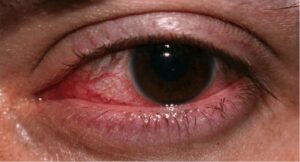Presbyopia is a condition that affects the ability to see close objects clearly. It is caused by the natural aging process and usually begins to occur in people around the age of 40. If you are experiencing difficulty reading small text or seeing close-up objects, you may be a candidate for presbyopia Lasik surgery. In this blog post, we will discuss the benefits of presbyopia LASIK surgery and how it can help improve your vision!
Contents
Understanding Presbyopia Lasik
 Presbyopia is a condition that affects the ability of the eye to focus on near objects. It typically occurs in people over 40 and is caused by the loss of elasticity in the lens, making it more difficult for the eye to change its focus from far to near objects. This can lead to difficulty reading small text or normal daily tasks such as tying a shoelace.
Presbyopia is a condition that affects the ability of the eye to focus on near objects. It typically occurs in people over 40 and is caused by the loss of elasticity in the lens, making it more difficult for the eye to change its focus from far to near objects. This can lead to difficulty reading small text or normal daily tasks such as tying a shoelace.
Lasik, also known as laser-assisted in situ keratomileuses, is a type of eye surgery that uses lasers to reshape the cornea and allow for improved vision. It can be used to correct long-sightedness, short-sightedness, and astigmatism, as well as other vision impairments.
Presbyopia Lasik is a type of refractive surgery that combines the principles of traditional Lasik technology with an additional procedure to improve near vision.
How Does Lasik Work For Presbyopia?
It is important to understand how Lasik works in order to consider if it is a good option for treating your presbyopia. Because of the aging process, the lens in your eye can become less flexible and therefore cannot focus on near objects.
Lasik works to permanently change the shape of your cornea so that it can more accurately focus light toward the back of your eye and cure your presbyopia. The process is usually done with an excimer laser, which is used to reshape your cornea and create a new focal point.
In fact, Lasik for presbyopia is two procedures in one. It is used to correct both nearsightedness and farsightedness, as well as presbyopia. And that further increases the chance of achieving better vision, even if you already have a refractive error or presbyopia.
What Are The Benefits Of Lasik For Presbyopia?
Lasik offers a number of benefits for those who suffer from presbyopia. These include:
Improved vision
Presbyopia Lasik improves vision by reshaping the cornea, allowing for improved focus and clarity of vision. The process is simple and quick, allowing for increased comfort and convenience. In fact, improved vision is one of the common and primary benefits of Lasik for presbyopia.
Quick recovery time
Unlike other presbyopia treatments, such as bifocals or reading glasses, Lasik surgery only requires a short recovery period so you can get back to life quickly. Because the surgery itself does not require stitches, you will be able to get back on your feet within a few hours of the procedure.
Accuracy and reliability
Presbyopia Lasik is a highly accurate procedure, and its results are reliable in the long term. The lasers used in this procedure target areas of the eye specifically, allowing for precise adjustment of vision. Lasik surgery is also very safe, and therefore is a low-risk option for correcting vision.
Reduced risk of eye strain and headaches
With improved vision due to Lasik surgery, symptoms such as eye strain and headaches that may have been caused by presbyopia can be reduced. This happens because Lasik surgery helps to improve the focusing capabilities of the eyes and makes it easier for them to focus on close-up objects.
Cost-effective
 Finally, it is important to note that presbyopia Lasik is a very cost-effective treatment for those who want to address the degeneration of their vision caused by presbyopia. Compared to other vision correction treatments such as glasses and contacts, Lasik is typically more cost-effective and the long-term benefits make it an attractive option. Additionally, the procedure can be completed in just one session so there is less downtime required than with other treatments.
Finally, it is important to note that presbyopia Lasik is a very cost-effective treatment for those who want to address the degeneration of their vision caused by presbyopia. Compared to other vision correction treatments such as glasses and contacts, Lasik is typically more cost-effective and the long-term benefits make it an attractive option. Additionally, the procedure can be completed in just one session so there is less downtime required than with other treatments.
All in all, these are a few benefits that presbyopia Lasik can provide. With its improved vision, reduced eye strain and headaches, as well as its cost-effectiveness, it is no wonder why so many people choose this treatment for the degeneration of their vision caused by presbyopia.
Therefore, if you are seeking a vision correction treatment that can help you see clearly again, consider looking into presbyopia Lasik. You may be surprised at just how many benefits it offers!
Is LASIK Worth It Over 40?
Presbyopia is a vision condition that affects individuals over the age of 40. It occurs when the eyes gradually become less flexible and it becomes harder to focus on close-up objects. People with presbyopia often experience blurred near vision and the need for reading glasses or bifocals.
Lasik after 40 may be a great solution to presbyopia. Because this treatment is often referred to as “monovision” LASIK, it can correct both far and near vision in the same eye. During the procedure, an ophthalmologist uses a laser to reshape the cornea.
The goal is to create a lens that refocuses light onto the retina of each eye differently so that one eye focuses on distant objects and the other focuses on near objects. This allows people suffering from presbyopia to see both near and far without glasses or contact lenses.
It can be a great option and worth it for people over 40, but it is important to consult with your eye doctor to determine if you are a good candidate for the procedure.
Who Should Avoid Presbyopia Lasik?
Although it is a safe and effective procedure, Presbyopia Lasik is not for everyone. There are some conditions and medical issues that can negatively affect the outcome of the procedure, so it is important to discuss your medical history with a skilled doctor before making any decisions.
Presbyopia Lasik should be avoided by people who:
- Have an irregularly shaped cornea
- Already suffer from severe vision loss or astigmatism
- Have a weak immune system
- Are pregnant or breastfeeding
- Are taking certain medications
These certain limitations are the reason why Presbyopia Lasik is not suitable for everyone. Therefore, it is important that you understand your own medical history and limitations before deciding if Presbyopia Lasik will be a good option for you.
What Are Some Risks And Complications?
 Despite the numerous benefits, there could be some risks associated with Presbyopia Lasik.
Despite the numerous benefits, there could be some risks associated with Presbyopia Lasik.
Some of the most common side effects include:
- Infection: This is one of the most concerning risks with any kind of eye surgery. Lasik is typically a safe procedure, but if you’re not careful it can become infected, leading to more serious problems such as corneal ulcers or vision loss.
- Dry Eyes: Dry eyes are another common side effect of Presbyopia Lasik. Patients may experience dryness, burning, or itching after the procedure. This is usually temporary, but it can be uncomfortable and may require treatment with artificial tears to alleviate the symptoms.
- Glare: Glare and halos around lights are also common side effects of Presbyopia Lasik. This usually goes away eventually, but some people may find that it persists long-term. Fortunately, there are treatments that can help to reduce glare and halos.
- Undercorrection: In some cases, it may not correct vision as well as expected. This is usually due to an error in measuring corneal curvature or the healing process not going according to plan. In these cases, a follow-up procedure may be necessary to get the desired results.
Overall, Presbyopia Lasik is typically a safe and effective way to reduce nearsightedness and improve vision in those with presbyopia. It has the potential to drastically improve the quality of life for many people.
Be sure to discuss any risks or concerns with your ophthalmologist before undergoing the procedure. With proper care and attention, Presbyopia Lasik could be a great option for improving vision and reducing nearsightedness.
Conclusion
In conclusion, presbyopia Lasik can provide a significant improvement in vision for those who suffer from presbyopia. By reshaping the curvature of the cornea and allowing more light to be focused on the retina, Lasik can help reduce or even eliminate reading glasses for individuals affected by this condition.
While there are risks associated with any type of surgery, and especially those that involve the eyes, the risks associated with this are minimal. With proper care and by following the directions of your doctor, you can ensure that you will receive the greatest benefits from this procedure.
Lasik surgery is a safe 10-minute procedure to help you get rid of glasses. MantraCare offers the most advanced Lasik options. If you have any questions on lasik surgery feel free to reach out to us at +91-9711116605.
